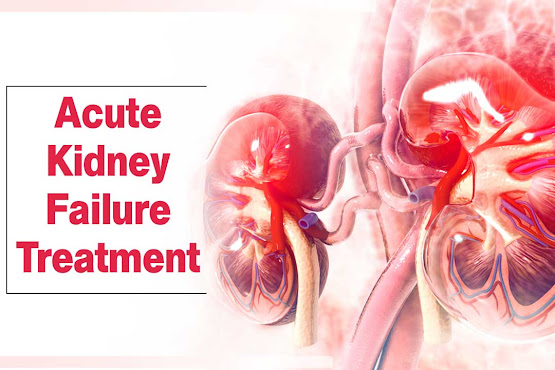What Complications Can Arise From Acute Kidney Failure?
Acute Kidney Injury (AKI) is the term that has recently replaced the term Acute Renal Failure (ARF). AKI causes an abrupt decrease in kidney function (within hours or a few days), which can be due to structural damage and impairment or loss of function. This loss can range from minor kidney function loss to complete kidney failure.
This type of kidney damage is usually found in older people who are also suffering some other conditions, and that condition is affecting their kidney function. For any reason, the problem should be detected early and treated promptly.
Without adequate treatment, abnormal levels of chemicals build up in the body and affect the ability of other organs to work properly. When your kidney functions decrease abruptly, you may require temporary support from the dialysis machine, or it can lead to death. AKI accumulates waste products in your blood. It is difficult for the kidneys to keep the right balance of fluids in your body. It also affects other organs like the brain, heart, and lungs.
Symptoms of acute kidney failure
AKI is different from chronic kidney disease. In CKD, the kidneys gradually lose their ability to function. It has also been seen that AKI also causes no symptoms and can only be diagnosed through other tests.
Symptoms of AKI include:- chest pain confusion
- dehydration
- diarrhoea
- drowsiness
- fatigue or tiredness
- nausea
- seizures or coma in severe cases
- shortness of breath
- edema of legs and ankle region
- urine outflow is less than usual
Who's at risk of acute kidney failure?
You are more likely to get AKI if you are:- ageing 65+yrs
- having a kidney problem.
- diabetics
- chronic heart or liver disease.
- severely dehydrated
- having blockage in the urinary tract.
- having a severe infection or sepsis
- on certain medicines like NSAIDs
Causes of acute kidney failure
Most cases of AKI are linked to reduced blood flow, direct damage to the kidneys, or blockages in the urinary tract. It is usually seen in people suffering from other health conditions.
AKI can also be caused by glomerulonephritis.
Decreased blood flow
Some conditions slow down the blood flow to your kidneys and cause AKI.
These diseases and conditions include:
- Blood or fluid loss (such as bleeding, Vomiting, or Severe Diarrhoea)
- Certain Allergic reactions
- Chronic Heart diseases
- Injury
- Low blood pressure (Hypotension) or shock
- Major surgery
- Organ failure (heart or liver)
- Overuse of pain medicines called "NSAIDs
Direct Damage to the Kidneys
Some diseases and conditions can damage your kidneys and further lead to the development of AKI. Some examples include:
- Sepsis, a life-threatening infection
- Cancer, known as "multiple myeloma."
- A rare condition called "vasculitis" is where the blood vessels inflammation and scarring make them stiff, weak, and narrow.
- Interstitial nephritis
- Scleroderma, affecting the connective tissue
Blockage of the urinary tract
Conditions that cause blockage and hamper the passage of urine outflow can also lead to AKI.
Blockage can be due to the following:
- Bladder, prostate, or cervical cancer
- Blood clots in the urinary tract
- Enlarged prostate
- Kidney stones
- Neural Problems affecting the bladder and urination process
Hat tests are used to assess acute kidney failure?
It is important that AKI should be assessed as soon as possible. Depending on the cause of the problem, your physician will suggest different tests.
The following tests are done for assessment:
- uring urine output
- Urine tests
- Blood tests for Creatinine, Urea, etc
- GFR (Glomerular Filtration Rate)
- Imaging tests: like USGs (Ultrasounds), MRIs, etc.
- Kidney biopsy
Locations associated with acute kidney failure
complications associated with acute kidney failure are:
- levels of potassium in the blood can lead to muscle weakness, paralysis, and heart problems
- Pulmonary edema (fluid in the lungs)
- Metabolic acidosis, nausea, vomiting, drowsiness
- Breathlessness
Efficient acute kidney failure treatment
Allopathy recommends dialysis for patients with acute kidney failure. When kidneys are unable to perform the process of blood filtration and removal of excess fluids and impurities from the blood, this process is performed artificially via dialysis. When the problem is not treated promptly, you mostly reach the state requiring a kidney transplant. We do not have any sure treatment for kidney diseases in Allopathy.
Acute kidney failure treatment in Ayurveda is vital in helping you get rid of it. Ayurveda treats the human body as a single entity, an ancient science with complete knowledge of the human body. It helps you with the ways that keep your body disease-free and healthy. Ayurvedic kidney treatment works to root out the cause responsible for the diseases. It suggests natural herbs, a balanced diet, and practising yoga to cure a disorder. With other medicines combinations, ayurvedic medicines like Punarnava, Varun, Kasni, Palaash, Gokshur, etc., are used for kidney problems. These herbs eliminate kidney problems and work toward the restoration of damaged kidney cells. These herbal preparations used in ayurvedic treatment enhance the functioning of kidneys.
Acute kidney failure treatment in ayurveda stimulates the kidneys' overall health and helps you get rid of kidney disorders. The treatment has the least side effects on your health during or after.











Comments
Post a Comment